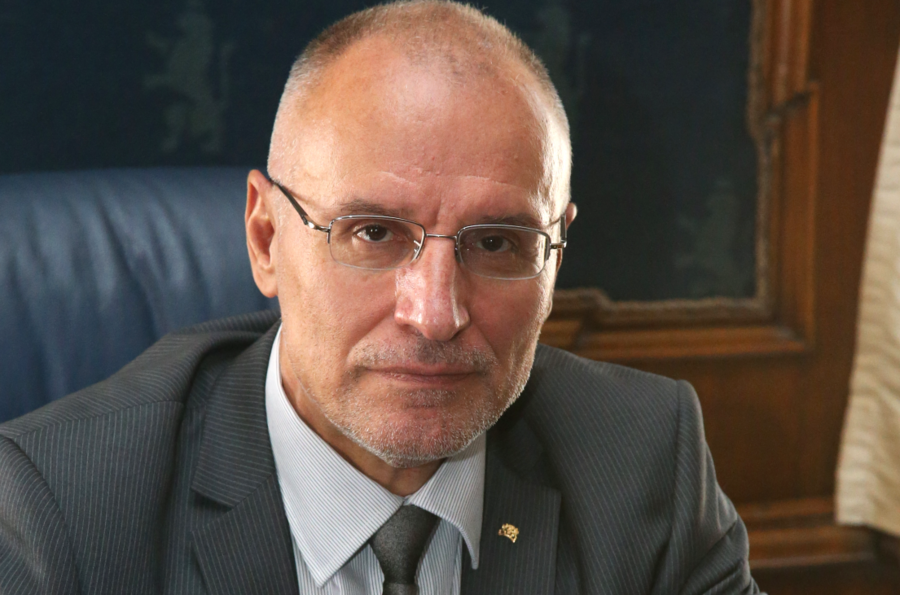By Slav Okov and Alexander Weber, Bloomberg Europe
Dimitar Radev, head of Bulgaria's central bank, says his experience with a planned economy will be useful as ECB policymakers grapple with interventionist governments.
Radev believes politics is a source of volatility, uncertainty, and systemic risk that central banks must factor into their assessments, according to him.
Radev says the ECB's task is to calibrate policy with a steady hand, taking into account the global context and balance of risks, including those related to trade and geopolitical developments, he said.
Dimitar Radev, who’ll help set euro-zone interest rates from next year, has seen more than his fair share of political upheaval.
The 69-year-old head of Bulgaria’s central bank was a Finance Ministry official in the 1980s when the Communist government abruptly closed it. After witnessing the regime’s eventual collapse and the ministry’s reinstatement, he helped his country emerge from a bout of hyperinflation before joining the push to make it the euro area’s 21st member.
He says his familiarity with how a planned economy can go wrong will prove useful as European Central Bank policymakers in Frankfurt grapple with the consequences of a new wave of interventionist governments.
Indeed, when he takes his seat on the Governing Council on Jan. 1, officials may still be gauging the inflation implications of President Donald Trump’s sudden rewiring of global trade, as well as Europe’s jump in public spending.
‘I have direct experience with how fiscal and monetary policy were conducted under the centrally planned system,’ Radev said in an interview in Sofia. ‚More precisely, I understand how such policies should not be conducted. That experience has lasting value – primarily as a reference point for what to avoid.’
For him, the ECB must keep a more watchful eye on politics than was needed in the past. Recent events highlight the dangers that lurk beyond tariffs, with France’s drastic efforts to repair its public finances further pressuring its already weak government, and Trump repeatedly condemning the work of Federal Reserve Chair Jerome Powell.
‘Politics is often seen as a source of stability,’ Radev said. ‚In reality, it is increasingly a source of volatility, uncertainty and systemic risk. This is something central banks must factor into their assessments. Political developments, both domestic and global, are now part of the risk environment we operate in.’
Bulgaria, itself no stranger to political volatility having held seven elections in four years, sees euro-area membership as the culmination of its efforts to build a more robust economy.
After hyperinflation abated in the 1990s, the country pegged its currency, the lev, first to the Deutsche mark and then to the euro – effectively surrendering control over its monetary policy in the process. It’s hoped that adopting the common currency will boost trade and investment.
But joining the bloc also required a cleanup of Bulgaria’s financial sector, where murky ties between politicians and businesses triggered a banking crisis just over a decade ago. Radev took over the central bank in 2015 after the country’s No. 4 lender collapsed.
It was under him that banks had to pass one domestic and one ECB stress test. Results showed that even years later some of the old problems lingered. Facing distrust from existing euro members, Bulgaria was forced to join the bloc’s banking union alongside the ERM II exchange rate mechanism – something all aspirant nations must now do.
Inflation was also a challenge following Russia’s attack on Ukraine, when prices shot up more forcefully than in the broader region. It’s since been more aligned with the euro zone, paving the way for the country’s accession, but has quickened a touch of late.
The outlook for inflation across the currency bloc is precarious, however, with an undershoot and an overshoot of the ECB’s 2% target both seen as threats. Before clarity on trade with the US, officials are widely expected to keep borrowing costs steady next week, following eight cuts since June 2024.
At 2%, the ECB’s deposit rate is ‘within or very close to the broad interval typically associated with neutral territory,’ Radev said, referring to the range that neither stimulates nor restricts economic growth.
‘Any further adjustment – with some room opening for a gradual recalibration, if warranted – would be cautious and based on incoming data,’ he said. ‘I do not expect abrupt shifts. The task going forward is to calibrate policy with a steady hand, taking into account both the global context and the balance of risks, including those related to trade and geopolitical developments.’
Asked whether he feels closer to the Governing Council’s hawkish or dovish camp, Radev – who’ll attend meetings as an observer from September – said he’s ‘never answered that question directly’ and won’t do so now.
‘My position has been consistent over the years and is rooted in long-standing experience in both monetary and fiscal policy,’ he said. ‘That perspective inevitably leads to a conservative stance – one firmly grounded in a strict reading of the central bank’s mandate.’
Before returning to Bulgaria to lead the central bank in 2015, Radev worked at the International Monetary Fund, which is now headed by his compatriot Kristalina Georgieva. There, he led missions on public-finance management in more than 20 countries from Africa to central Asia.
He’ll join the ECB after this year’s rapid appreciation of the euro against the dollar. The central bank is trying to seize the moment and raise the currency’s global profile — an initiative that Radev backs.
‘In today’s global environment, developments surrounding the dollar are inevitably reshaping the international monetary landscape,’ he said. ‘The role of the euro must and will grow. The more pertinent question is whether the necessary conditions will be created – institutionally and politically – to support this evolution within the broader framework of euro area policy’.

